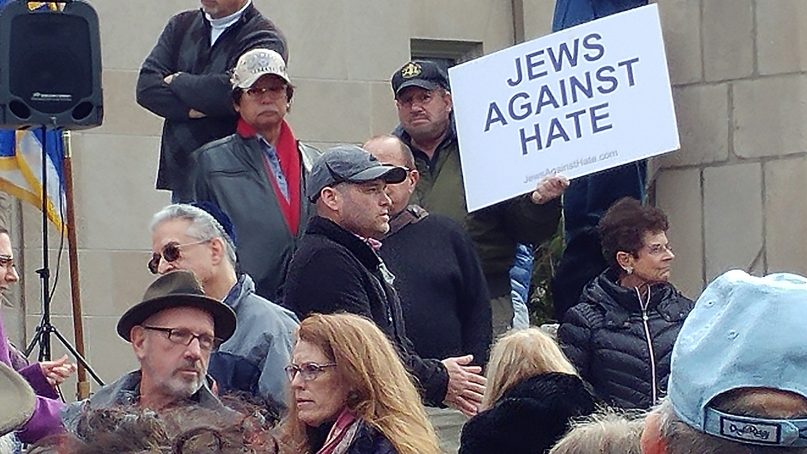They shut off the block of Farmington Avenue in front of Temple Beth Israel in West Hartford Sunday evening as a crowd of 2,000 gathered for an interfaith vigil on behalf of the 11 Jews killed at the Tree of Life synagogue in Pittsburgh.
There were clergy and an array of state and local officials who condemned the most deadly attack on Jews ever to occur in the United States. There was a good deal of talk about the growth of anti-Semitism and the need for solidarity across religious lines. While no one uttered the words “Donald Trump,” there were pointed remarks about demagoguery and how the political leaders of Connecticut never fail to stand against bigotry.
But only South Windsor Mayor Saud Anwar, representing the Muslim community, mentioned the elephant in the room. “We have a collective responsibility,” he said. “We will take care of the stranger. We will take care of the refugee.”
Yes, Robert Bowers, the alleged killer, seems to be a classic anti-Semite, seeing a malignant Jewish conspiracy behind everything he doesn’t like. But the evidence indicates that it was Jewish support for migrants that caused him to take up his guns on Saturday.
He had been railing on the social media site Gab against HIAS, the Jewish agency that works on behalf of refugees of all kinds. He specifically mentioned HIAS’ National Refugee Shabbat, which synagogues across the country celebrated a week before the massacre.
In fact, no one should be surprised that a large segment of the Jewish community stood up to oppose the Trump administration’s policy of separating children from parents at the southern border.
“As Jews, we know what it is like to leave one’s country of origin in search of peace and freedom from oppression,” declared a statement from the Jewish Federation of Greater Hartford last June. “Our Torah reminds us again and again that we should not wrong or oppress a stranger, because we too were once strangers in a new land.” The statement concluded: “We stand with dozens of national organizations from across the spectrum of Jewish tradition in condemning this immoral policy and demanding that the administration rescind it.”
But it’s important to understand that this view was not unanimous. In response to the statement, Federation President Howard Sovronsky received what he described in an interview as “terrible, nasty emails.” So far as some members of our community are concerned, criticism of President Trump is more objectionable than tearing children away from their parents.
During the civil rights era, it was common for white Southerners to deplore the activism of black religious leaders as destroying “the spirituality of the church.” So too, today, it is no hypothetical danger that religious communities, Jewish and non-Jewish, will choose to remain silent on fundamental issues in the face of loud and angry objections from fellow congregants whose political commitments place them on the side of immorality.
This cannot be allowed to happen. We must redouble our support for the stranger, for the refugee, even at the expense of alienating some of our own. Otherwise we dishonor the memory of the martyrs of Pittsburgh.






